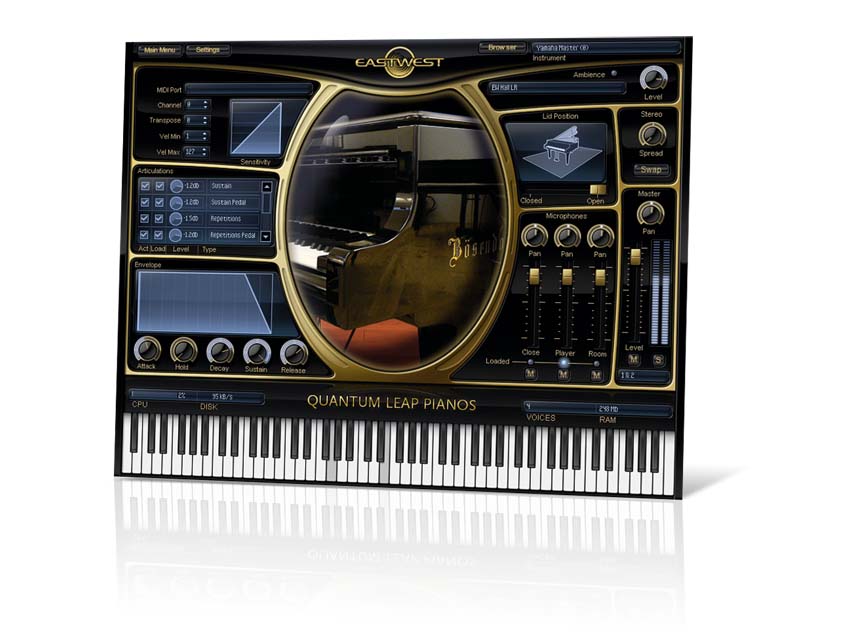MusicRadar Verdict
QL Pianos is one of the very best piano emulations we've heard, which makes its gargantuan size easier to swallow.
Pros
- +
Fantastically realistic sound. Each piano has a clear signature tone. Good articulations system. Useful 'lite' patches.
Cons
- -
Long patch load times. May require its own hard disk.
MusicRadar's got your back
Weighing in at 263GB and shipping on 35 DVDs, Quantum Leap Pianos is one of the biggest ROMplers yet seen. It covers four famous concert pianos from Bösendorfer, Yamaha, Bechstein and Steinway.
Given the library's scale, it's no surprise that you can install each piano separately, but even so, it still took us the best part of a day to get the whole thing onto our drive. Like other products that use EastWest's Play engine, the interface and skin are tailored to the specifics of the instrument, and it has the same familiar browser that gives you access to all your Play libraries.
In detail
Each piano was sampled from three positions (room, close and player perspective) and your choice of miking aspect (all three can be used together) combined with various articulations, make up the patch.
There are also sound modification aspects, including an AHDSR envelope, convolution reverb, stereo spread, velocity sensitivity and level and pan controls. Possibly the most interesting parameter, though, is the lid position slider, which offers a continuous range of options from closed to open.
You may be wondering how such a large library is used, considering that not many of us have 263GB of RAM installed. As in other samplers, a combination of disk-streaming and a preload buffer is employed. However, Play also includes five engine options to help you fine-tune streaming behaviour.
To give you an idea of how this works in practice, using engine level 3 and a 512-sample driver buffer for the fully-fledged Steinway D (with all available articulations) with all three mic options loaded, our RAM usage was 506MB and our load time a few minutes. You can, though, load 'lite' patches, reducing memory usage and load times considerably - it might be an idea to load up the full patch for the final mixdown only.
Sound and summary
Sound and expression are all-important with acoustic pianos, and this bundle seriously delivers. From the quietest pianissimo to full-on, pedal-down rumble, the sound is wonderfully accurate, but also different from piano to piano.
We looked for level, sound and layer inconsistencies, but any we noticed were minimal. We found that the three mic positions sounded very different, and with four separate pianos and that lid control (which is akin to a subtle low-pass filter), we felt spoilt for choice.
Of course, nothing's perfect, and the sheer scale of QL Pianos means that those patch load times can be tedious. We also found that selecting additional mic positions didn't always cause them to load up, so we had to reload the full master patch.
The bottom line, though, is that if you're patient and want real acoustic piano sounds, Quantum Leap Pianos is one of the best on the market, and actually represents great value for money when compared to the competition.
Listen to the Quantum Leap Pianos being played:
Computer Music magazine is the world’s best selling publication dedicated solely to making great music with your Mac or PC computer. Each issue it brings its lucky readers the best in cutting-edge tutorials, need-to-know, expert software reviews and even all the tools you actually need to make great music today, courtesy of our legendary CM Plugin Suite.
“We were arguing a lot and we were miserable”: How Green Day exceeded expectations with their most ambitious song
"There’s plenty for us guitarists to learn – and ‘less is more’ is the overriding lesson": how to play like George Harrison on The Beatles' Abbey Road
“They didn’t like Prince’s bikini underwear”: Prince’s support sets for the The Rolling Stones in 1981 are remembered as disastrous, but guitarist Dez Dickerson says that the the crowd reaction wasn’t as bad as people think











